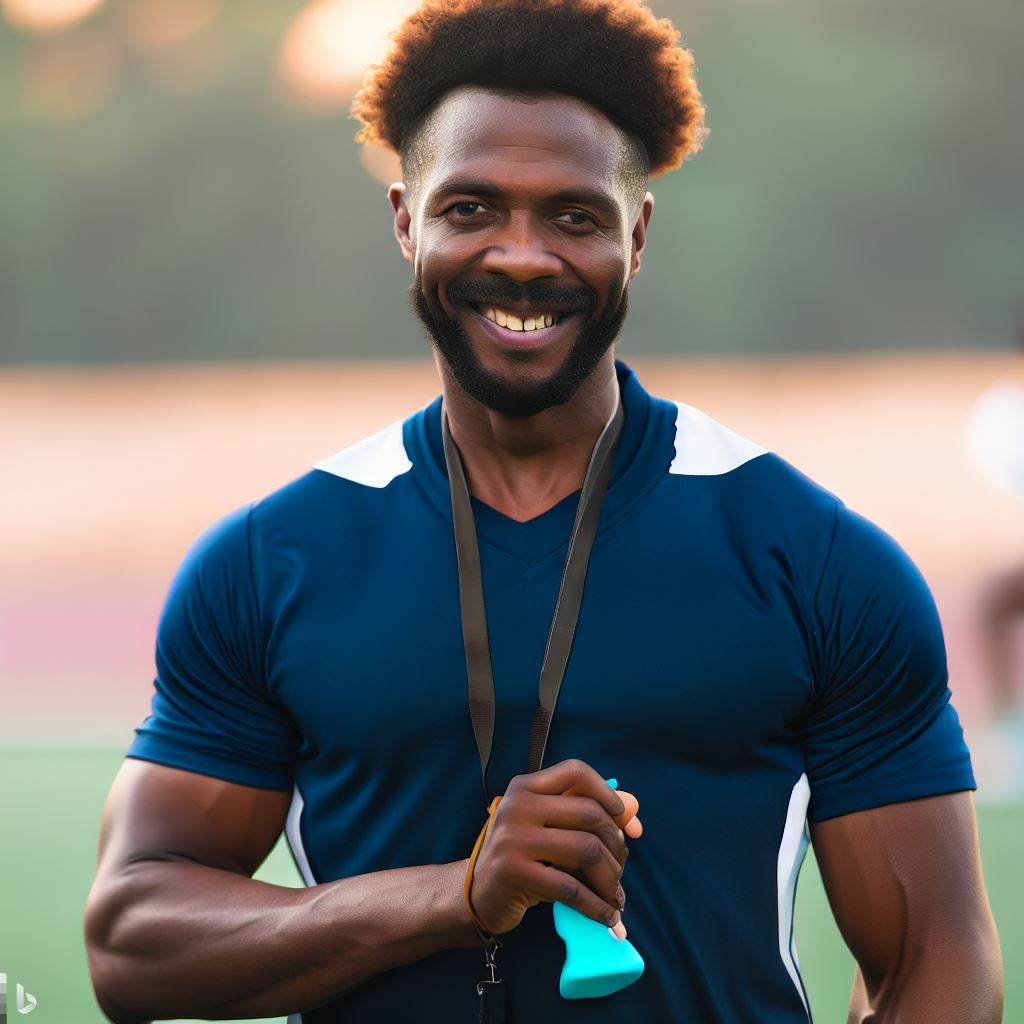Introduction
Becoming a sports information director is an exciting career path in the Sports Information Director Job Interview Tips.
Job interviews play a critical role in securing the position of a sports information director.
In this blog post, we will discuss essential tips for aspiring sports information directors to excel in job interviews.
Briefly Introduce the Topic of Becoming a Sports Information Director
Becoming a Sports Information Director (SID) is a dream for many sports enthusiasts who want to blend their passion with a career.
Explain the Importance of Job Interviews in Securing the Position
Job interviews are pivotal in determining whether you land the coveted role of an SID.
Transition into the Main Points of the Blog Post
- Showcase Your Knowledge: Demonstrate deep understanding of sports, teams, and industry trends during interviews.
- Highlight Communication Skills: Effective verbal and written communication is key in this role.
- Embrace Technology: SIDs need to be tech-savvy, handling websites, social media, and stats programs.
- Flexibility Matters: Showcase adaptability in handling game-day pressures and changing schedules.
- Display Organizational Skills: Managing schedules, statistics, and media relations requires excellent organization.
- Team Player Attitude: Emphasize your ability to collaborate with coaches, athletes, and media professionals.
- Passion for the Institution: Convey your genuine enthusiasm for the team and school’s success.
- Problem-Solving Ability: Highlight how you’ve overcome challenges in previous roles.
- Stay Updated: Be well-informed about the latest developments in the sports industry.
- Mock Interviews: Practice answering common SID interview questions to build confidence.
In summary, excelling in SID job interviews requires a blend of sports knowledge, communication prowess, adaptability, organization, teamwork, and genuine passion.
Preparing thoroughly can set you on the path to success in this exciting career.
Research and Preparation
Understand the role of a sports information director
As an aspirant for the position, it is crucial to fully grasp the responsibilities and expectations of a sports information director.
Research the company or institution you are applying to
Before your interview, gather as much information as possible about the organization you are seeking employment with.
Familiarize yourself with the sports programs and teams they have
Gain a comprehensive understanding of the various sports programs and teams that the company or institution is involved with.
Learn key statistics and facts about those teams
Take the time to delve into important figures and facts regarding the performance and achievements of these teams.
Research recent news or events related to the company or institution
Stay updated with the latest news and significant events related to the organization you are applying to.
Read: Women in Athletic Training in Nigeria: Opportunities and Challenges
Highlighting Relevant Experience
Identify and review your relevant experience and qualifications
Before going into a job interview for a Sports Information Director position, it is crucial to identify and review your relevant experience and qualifications.
This step will help you showcase your skills effectively during the interview.
Make a list of all the experiences and qualifications that align with the job requirements.
Include any degrees or certifications you possess related to sports management, journalism, or communication.
Also, consider highlighting any specialized knowledge you have, such as familiarity with specific sports or events.
Reviewing your relevant experience and qualifications will not only boost your confidence during the interview but also enable you to present yourself as an ideal candidate.
Showcase any previous work in a similar role or industry
If you have any previous work experience in a similar role or industry, it is essential to showcase it during your job interview as a Sports Information Director aspirant.
This demonstrates your familiarity with the demands and expectations of the position.
Include specific examples of your previous achievements and responsibilities in your resume or portfolio.
Highlight any notable events you managed or specific campaigns you led.
This will help the interviewer understand your capabilities and achievements in a tangible way.
If you have worked in a different industry but possess transferable skills, emphasize how your experience can benefit the company or institution you are applying to.
Transferable skills such as communication, organization, and attention to detail
As a Sports Information Director, strong communication, organization, and attention to detail are vital skills to possess.
During your interview, make sure to emphasize your proficiency in these areas.
Discuss your experience with written and verbal communication, including press releases, social media management, and interviewing athletes, coaches, or staff.
Emphasize your ability to effectively communicate complex information to a wide range of audiences.
Highlight your organizational skills by discussing how you managed multiple events or projects simultaneously.
Mention any experience you have with scheduling, budgeting, or coordinating logistics.
Showcasing your attention to detail can be done by discussing how you ensured accurate and up-to-date statistical information, fact-checking reports, or proofreading written content.
Provide examples of how your experience can benefit the company or institution
During a job interview, it is crucial to demonstrate how your experience can benefit the company or institution you are applying to.
Provide tangible examples of how your skills and expertise can drive success in the role of a Sports Information Director.
Discuss how your previous work improved the visibility and reputation of sports programs or organizations.
Showcase specific strategies you developed to engage fans, generate media coverage, or increase social media following.
Highlight any instances where your work resulted in increased ticket sales, sponsorship opportunities, or positive relationships with local media outlets.
By providing examples of your past achievements, you can convince the interviewer that you have the ability to make a significant impact in their organization.
Read: Continuing Education for Athletic Trainers in Nigeria
Developing a Strong Resume
A strong resume is essential when applying for a sports information director position.
It should effectively highlight your skills, experiences, achievements, and results in a clear and concise manner.
Tailor your resume to highlight skills and experiences related to the sports information director position
- Review the job description carefully and identify the key skills and experiences required for the role.
- Customize your resume to emphasize your relevant qualifications, such as communication skills, sports knowledge, media relations, and event management.
- Include any relevant academic degrees, certifications, or professional development courses you have completed.
Include specific achievements and measurable results
- Highlight your accomplishments in previous roles, such as increasing social media followers, improving website traffic, or successfully organizing large-scale athletic events.
- Use quantifiable metrics whenever possible, such as the percentage increase in audience engagement or the number of media mentions received.
- Showcase any awards or recognition you have received in your field, emphasizing your expertise and dedication.
Use clear and concise language
- Avoid using technical jargon or excessive industry-specific terminology that may be unfamiliar to the hiring manager.
- Use bullet points to present information in a concise and organized manner, making it easy for the reader to scan and understand your qualifications.
- Use action verbs to describe your responsibilities and achievements, such as “managed,” “developed,” “implemented,” or “spearheaded.”
Format your resume professionally
- Choose a clean and professional-looking font, such as Arial, Calibri, or Times New Roman.
- Use consistent formatting for headings, subheadings, and body text.
- Avoid using excessive colors, graphics, or unconventional layouts that may distract from the content.
- Organize your resume into sections, including a header with your contact information, a professional summary or objective statement, work experience, education, and relevant skills.
Proofread for errors and typos
- Carefully review your resume for any grammatical errors, spelling mistakes, or typos.
- Use spell-check tools and consider asking a friend or colleague to review your resume and provide feedback.
- Ensure consistency in formatting, punctuation, and capitalization throughout your resume.
By following these tips, you can create a strong and compelling resume that effectively showcases your qualifications and increases your chances of securing a sports information director position.
Remember to continually update and refine your resume to reflect your most recent experiences and achievements.
Read: The Future of Athletic Training in Nigeria: Expert Insights
Practice, Practice, Practice
Prepare for common interview questions, especially those related to the sports industry
To excel in a job interview for the role of Sports Information Director, it is crucial to anticipate and prepare for common interview questions, particularly those that relate specifically to the sports industry.
Research and become knowledgeable about the industry’s trends, current events, and challenges.
This will help you provide well-informed and relevant answers during your interview.
Practice answering questions about your experience and skills
In addition to preparing for industry-related questions, it is also vital to practice answering questions about your own experience and skills.
Review your resume and identify key accomplishments and experiences that make you a suitable candidate for the position.
Practice articulating these in a concise and compelling manner, highlighting how they align with the requirements of the Sports Information Director role.
Consider conducting mock interviews with a friend or mentor
To further refine your interview skills, consider conducting mock interviews with a friend, mentor, or career coach.
Ask them to pose common interview questions and practice responding to them effectively.
This exercise will help you become comfortable with articulating your thoughts and ideas in a structured and confident manner.
Seek feedback on your interviewing style and make necessary improvements
After each mock interview, seek feedback from your friend, mentor, or career coach on your interviewing style.
Ask them to highlight areas where you can improve, such as clarity of communication, body language, and overall confidence.
Take their suggestions constructively and work on making necessary improvements.
By practicing in these ways, you will enhance your ability to perform well in job interviews for Sports Information Director positions.
This preparation will help you feel more confident, and your answers will come across as well thought-out, professional, and tailored to the specific requirements of the sports industry.
Remember that practice is key to achieving success in any job interview, and the more you practice, the better equipped you will be to handle any situation or question that may arise.
So, dedicate time and effort to practicing your responses, refining your interviewing skills, and seeking feedback to continuously improve. Good luck with your job interview!
Read: Nigeria’s Assistant Coach Success Stories in 2022

Showcasing Passion and Enthusiasm
Express genuine interest in the sports information director role
During a job interview for a sports information director position, it is essential to convey your genuine interest in the role.
Let your enthusiasm shine through by discussing why you are excited about the opportunity.
Demonstrate your passion for sports and your desire to contribute to the company or institution
Showcasing your passion for sports and your eagerness to make a meaningful contribution to the company or institution is crucial.
Highlight how your deep love for sports motivates you to excel in this role.
Share specific examples of how you have been involved in sports or related activities
Bringing up specific instances where you have actively engaged in sports or participated in related activities will demonstrate your dedication.
Talk about any relevant experiences that highlight your commitment and skills in the sports industry.
Ask thoughtful questions about the company or institution’s sports programs
Show your keen interest by asking thoughtful questions about the company or institution’s sports programs.
Inquire about their current initiatives, future plans, and how the sports information director can contribute to their success.
By showcasing your passion and enthusiasm during a job interview, you can make a lasting impression on the interviewer and increase your chances of securing the sports information director role.
Professional Appearance and Etiquette
Dress professionally for the interview, even if the company or institution has a casual dress code.
When interviewing for a position as a Sports Information Director, it is important to dress in a professional manner.
Even if the company or institution has a casual dress code, it is best to err on the side of formality.
By dressing professionally, you show respect for the job and demonstrate that you take the opportunity seriously.
Be punctual and arrive early for the interview.
Punctuality is key when it comes to job interviews. Arriving late not only shows a lack of respect for the interviewer’s time but may also create a negative first impression.
Plan your timing carefully, ensuring that you leave ample time for unexpected delays.
Arriving early will give you a chance to collect your thoughts, calm your nerves, and prepare for the interview.
Display confident body language throughout the interview.
Body language plays a significant role in job interviews.
By maintaining confident body language, you convey self-assurance and professionalism to the interviewer.
Sit up straight, maintain good posture, and avoid fidgeting.
Use hand gestures when appropriate, as they can help emphasize key points during the conversation.
Maintain eye contact and engage in active listening.
Eye contact is a vital component of effective communication. During the interview, make sure to maintain eye contact with the interviewer.
It shows your attentiveness and interest in the conversation. Additionally, actively listen to what the interviewer is saying.
Nod your head to show understanding and ask relevant questions to demonstrate your engagement.
Thank the interviewers for their time and follow up with a thank-you note or email.
At the end of the interview, express your gratitude to the interviewers for their time. A simple thank-you can go a long way in leaving a positive impression.
Additionally, it is essential to follow up with a thank-you note or email within 24 hours of the interview.
This gesture not only shows your appreciation but also gives you the opportunity to reiterate your interest in the position.
Maintaining a professional appearance and practicing proper etiquette are crucial aspects of a job interview for Sports Information Director aspirants.
Dressing appropriately, arriving on time, displaying confident body language, maintaining eye contact, and expressing gratitude will help create a positive impression on the interviewers.
By adhering to these guidelines, you will increase your chances of landing the desired position.
Conclusion
In summary, this blog post discussed essential tips for aspiring Sports Information Directors.
Apply these tips to enhance your chances of success in job interviews.
Remember, pursuing a career as a Sports Information Director is a rewarding journey, so stay motivated!
Summarize the Key Points Discussed in the Blog Post
- Show deep sports knowledge.
- Highlight communication skills.
- Embrace technology.
- Be flexible and organized.
- Demonstrate teamwork.
- Passion for your institution.
- Problem-solving ability.
- Stay updated and practice.
Encourage Readers to Apply These Tips to Increase Their Chances of Success
Put these strategies into action to stand out and secure your dream job as a Sports Information Director.
Conclude with a Motivational Statement Regarding Pursuing a Career as a Sports Information Director
Remember, pursuing your passion in sports through an SID career is not just a job; it’s a rewarding journey. Keep pushing!




